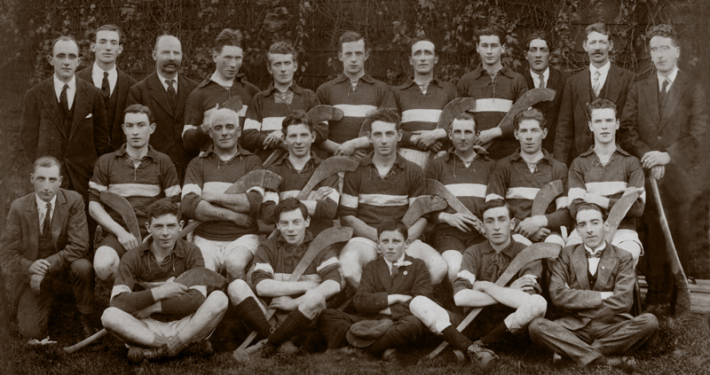History of Cuala GAC / Stair Cuala
Cuala Hurling Club was founded in 1918 by Charlie Somers, John McGuiness, Paddy Darcy, Eamon Quirke, Paddy Delaney and Noel Glynn. Whilst there were many clubs operating around Dunleary Borough before this date, this is the first ancestral club that we can be confident presents an unbroken chain of players to todays club. The team (pictured) contained many players who are related to current Cuala members. They played at the “Firm” Quarry off Dalkey Avenue near Hillside.
The Club was active into the 1930s but became inactive, it is supposed, due to emigration and lack of players. However, Gaelic Games were revived in the locality in 1948 (Naomh Mhuire Camogie), 1956 (St Begnet’s GAA), 1962 (Cuala Boys) and 1966 (Roger Casements). All of these clubs were to become part of the Cuala family as they merged over the years
In 1962, St Begnet’s was renamed Dalkey Mitchel’s.
Five years later, in 1967, Roger Casements merged with Cuala Boys and, in 1972, that club changed its name to Cuala Casements and became closely associated with Naomh Mhuire Camogie – then still an independent club.
Dalkey Mitche’s and Cuala Casements merged in 1974 to form Cuala Hurling & Football Club and, in 1979, the members of St Mary’s formally joined Cuala to form a Ladies Section of what became Cuala Hurling, Football & Camogie Club.
The name Cuala referred to the ancient territory which comprised much of South Co. Dublin and North Co. Wicklow stretching between Dundrum, Greystones and the Sugarloaf. The popularity of the name “Cuala” was driven by Conradh na Gaelige (Gaelic League) who’s regional organisation (covering many branches in North Wicklow and South Dublin) was called Ceantair Cuala. Their members were not only devoted to developing Irish Language and Arts but were instrumental in the formation of local Gaelic Sports teams and competitions. One such Conradh initiative was the promotion of the Cuala Marian League – a schoolboy league covering south Dublin and North Wicklow. It was organisers of that League that later gave Cuala Boys its unique name in 1962.
Read more about Cuala History in our full list of articles via the button link below.


